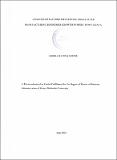Analysis of Factors Influencing Small Scale Manufacturing Businesses Growth in Meru Town, Kenya

View/
Date
2013-06Author
Karume, Kirira David
Type
ThesisLanguage
enMetadata
Show full item recordAbstract
The research analyzed factors influencing growth of small scale manufacturing businesses in Meru town. Over years Small businesses in Kenya have experienced many constraints that have inhibited realization of their full potential. A number of them are stagnating, retrogressing and eventually closing down after a few years of operation. Very few manage to graduate to medium or large businesses.. Also gave recommendations on the way forward. The target population was 132 small scale manufacturing businesses and a sample population of 70 small manufacturing businesses was taken. A descriptive survey research design was employed to collect data. The primary data was collected using a structured questionnaire. The questionnaire contained a list of closed and open ended questions to take care of all the responses which could not fit in the given categories. The data was edited, coded, classified and tabulated. The findings were analyzed and presented in the form of frequency tables, numerical values and percentages generated through Statistical Package for Social Science (SPSS) (Version 17) computer software. Multiple regression analysis was used to find out whether all the independent variables together predict the dependent variable. From analyzed data, the Government of Kenya could use the information to develop appropriate policy on the sector to enhance its growth and contribution to the growth of Kenyan economy and development. From the study the small scale manufacturing business owners will be able to realize their potential and contribute to their welfare and poverty eradication in Kenya. The study objectives were to investigate whether technology, economic factors, managerial training and level of competition influenced growth of small scale manufacturing businesses in Meru town. The findings show gender of respondents in which majority are male with marital status of the respondents showing that majority are married. Majority of the respondents are in the age blanket of 25-35, have attained secondary school education, had not been employed before starting their business and started their business because they had the required technical skills. Majority of the respondents got the capital to start their business from their own savings and never attended any seminar. Majority of the respondents never attended trade fairs and never attended business management trainings. Majority of the respondents agreed with the statement that having business management skills affects Small business growth. Most of the respondents were sole owners and that enterprises number of employees stayed constant. Majority of enterprise had Ksh 50,000 or fewer turnovers and believe that poor economy is the cause of their businesses decline in performance while majority are aware of modern technology. Most of the respondents sell their products locally within the town of Meru and their main problem was lack of adequate funds while majority agreed with the statement that availability of close substitute goods affects the growth of their businesses. The co-efficient critical value of Business Management Skills is p <0.05 which results in rejecting the null hypothesis, while the co-efficient critical value of Technology Application is 0.184 which results in accepting the null hypothesis; and the co-efficient critical value of Economic Factors is 0.355 which results in accepting the null hypothesis. While the co-efficient critical value of Competition is 0.530 which results 111 accepting the null hypothesis.
Publisher
KeMU
